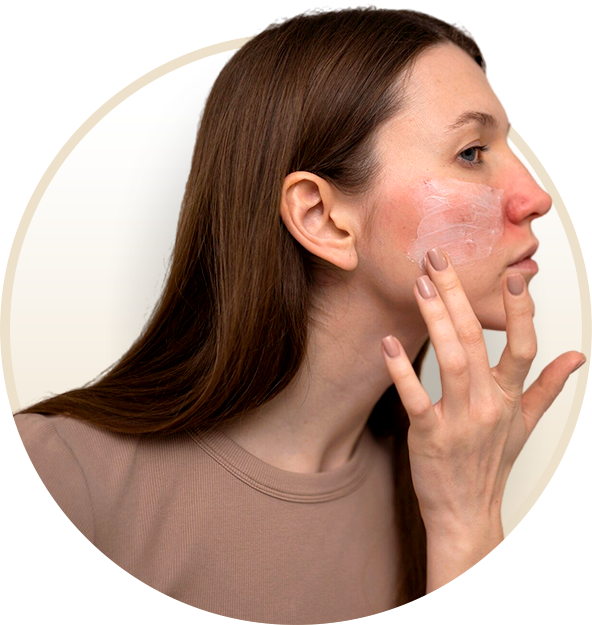
How Can a Healthcare Provider Help Me With Rosacea?
A healthcare provider can significantly assist in managing rosacea through a multifaceted approach tailored to your specific symptoms. Initially, they will conduct a thorough assessment of your skin and medical history to accurately diagnose rosacea, distinguishing it from other skin conditions with similar symptoms. Once diagnosed, the provider can recommend appropriate treatment options, which may include topical medications, oral antibiotics, or laser therapies to reduce redness and inflammation. They can also offer guidance on skincare routines and lifestyle modifications to avoid common triggers such as spicy foods, alcohol, and extreme temperatures.
Educating you about the nature of rosacea helps set realistic expectations for management and treatment outcomes. Regular follow-up appointments enable your provider to monitor your condition, adjust treatments as necessary, and ensure optimal care. Overall, partnering with a healthcare provider can empower you to effectively manage rosacea and improve your skin's appearance and comfort.
Connect NowHow It
Works
Request an Appointment
Visit www.medcareconnect.ca to start the simple and easy process of being put in touch with a healthcare facility and provider.
Connect with a Healthcare Facility & Provider
The MedCare Connect team will put you in touch with a healthcare facility and provider and notify you of your upcoming appointment.
Receive Medical Advice, a Diagnosis and Treatment
The healthcare provider can provide you with a diagnosis, prescription, doctor’s note, specialist referral or order lab work when deemed necessary.
Pricing
Ontario Residents
Free, 100% OHIP covered with a valid Ontario health card.
$50 CAD consultation fee without a valid Ontario health card.
Private Insurance
Direct billing available with our affiliated insurance partners.
All major insurance plans accepted for international students and uninsured individuals.
Coverage and eligibility vary by insurer. Please check your policy for coverage eligibility. For non-affiliated insurance partners, patients are required to pay a $50 CAD consultation fee. A receipt will be issued for you to reimburse to your insurance company for assessment of reimbursement.
Uninsured Services
Certain services are not covered by provincial or private insurance and may incur extra fees at the end of your appointment.
Please note that certain forms and documents may require an in-person assessment at a local healthcare facility and will be filled in at the healthcare provider’s discretion, when medically appropriate.
Frequently Asked Questions
In Ontario, OHIP (Ontario Health Insurance Plan) typically covers consultations with physicians, including family doctors and specialists, for medically necessary services. This coverage extends to consultations related to various health concerns, including acne treatment, if deemed necessary by the physician.
For patients with an invalid/expired health card or for patients who do not have a health card, there would be a consultation fee.
Yes, we accept all major insurance plans for international students and uninsured individuals. Direct billing is available with our affiliated insurance partners. Coverage and eligibility vary by insurer. Please check your policy for coverage eligibility. For non-affiliated insurance partners, patients are required to pay a consultation fee. A receipt will be issued for you to reimburse to your insurance company for assessment of reimbursement.
Rosacea is a chronic skin condition that primarily affects the face, characterized by persistent redness, visible blood vessels, and sometimes acne-like bumps. It typically manifests in flare-ups, with symptoms varying in intensity. Commonly affected areas include the cheeks, nose, forehead, and chin. While rosacea is more prevalent in fair-skinned individuals and women, it can affect anyone. The exact cause remains unclear, but it involves a combination of genetic and environmental factors that lead to inflammation.
Various triggers can exacerbate rosacea symptoms, and they often differ from person to person. Common triggers include sun exposure, hot or cold weather, spicy foods, alcohol, caffeine, stress, and vigorous exercise. Additionally, certain skincare products or harsh cosmetics can irritate the skin and worsen symptoms. Keeping a symptom diary can help individuals identify and manage their specific triggers.
Rosacea is classified into several subtypes, each with distinct characteristics. The most common type is erythematotelangiectatic rosacea, which involves persistent redness and visible blood vessels. Papulopustular rosacea resembles acne, featuring red bumps and pustules. Phymatous rosacea, though less common, leads to thickened skin, often affecting the nose (rhinophyma). Lastly, ocular rosacea affects the eyes, causing redness, irritation, and swollen eyelids. Each subtype may require different management strategies.
Diagnosis of rosacea typically involves a physical examination by a healthcare provider, who will assess the skin's appearance and inquire about symptoms and triggers. In many cases, a biopsy is not necessary; however, if symptoms are atypical, a provider may perform tests to rule out other skin conditions like acne or dermatitis. A thorough history of flare-ups and potential triggers aids in confirming the diagnosis.
Treatment for rosacea often involves a combination of lifestyle changes and medical interventions. Topical treatments, such as metronidazole or azelaic acid, can reduce inflammation and redness. For more severe cases, oral antibiotics like doxycycline may be prescribed. Laser therapy and intense pulsed light (IPL) treatments can effectively target visible blood vessels and reduce redness. It's important to work with a healthcare provider to create a personalized treatment plan based on individual symptoms and severity.
Yes, lifestyle modifications can significantly help in managing rosacea. Individuals should focus on identifying and avoiding specific triggers, such as certain foods, beverages, or environmental factors. Incorporating a gentle skincare routine with non-irritating products is crucial. Using sunscreen daily can protect sensitive skin from sun exposure, which is a common trigger. Additionally, managing stress through relaxation techniques like yoga or meditation can also be beneficial.
